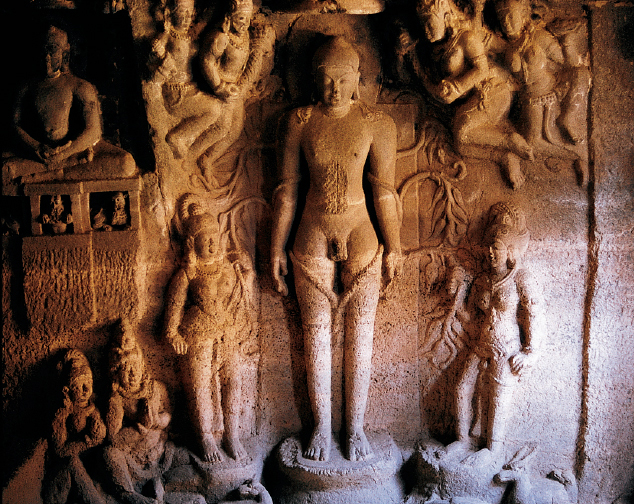Jainism
The key figure of Jainism, Vardhamana Mahavira (fl. ca. 520 B.C.E.), was the son of the chief of a small state and a member of the warrior class. Like many ascetics of the period, he left home to become a wandering holy man. For twelve years he traveled through the Ganges Valley until he found enlightenment and became a “completed soul.” Mahavira taught his doctrines for about thirty years, founding a disciplined order of monks and gaining the support of many lay followers, male and female.
Mahavira accepted the Brahmanic doctrines of karma and rebirth but developed these ideas in new directions, founding the religion referred to as Jainism. He asserted that human beings, animals, plants, and even inanimate objects all have living souls enmeshed in matter, accumulated through the workings of karma. The ascetic, who willingly undertakes suffering, can dissipate some of the accumulated karma and make progress toward liberation. If a soul at last escapes from all the matter weighing it down, it becomes lighter than ordinary objects and floats to the top of the universe, where it remains forever in bliss.

Mahavira’s followers pursued such liberation by living ascetic lives and avoiding evil thoughts and actions. The Jains considered all life sacred and tried to live without destroying other life. A Jain who wished to avoid violence to life became a vegetarian and took pains not to kill any creature, even tiny insects in the air and soil. Among the most conservative Jains, priests practiced nudity, for clinging to clothes, even a loincloth, was a form of attachment. Lay Jains could pursue Jain teachings by practicing nonviolence and not eating meat.
Although Jainism never took hold as widely as Hinduism and Buddhism, it has been an influential strand in Indian thought and has several million adherents in India today. Fasting and nonviolence as spiritual practices in India owe much to Jain teachings. In the twentieth century Mohandas Gandhi, leader of the Indian independence movement, was influenced by these ideas through his mother, and the American civil rights leader Dr. Martin Luther King, Jr., was influenced by Gandhi.